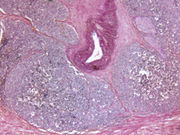Fewer bicalutamide patients died of prostate cancer compared to patients taking placebo
THURSDAY, Feb. 2, 2017 (HealthDay News) — When prostate cancer recurs after surgery, treatment with both radiation and bicalutamide can extend some men’s lives, according to a study published in the Feb. 2 issue of New England Journal of Medicine.
William Shipley, M.D., of Massachusetts General Hospital in Boston, and colleagues studied 760 men who’d undergone surgery for localized prostate cancer and later had a biochemical recurrence. The authors randomly assigned the patients to either bicalutamide or placebo pills every day for two years. All of the men underwent 6.5 weeks of radiation.
After 12 years, the researchers found that 76.3 percent of men who’d received radiation and bicalutamide were still alive. That compared with 71.3 percent of those who’d received radiation alone. Fewer bicalutamide patients died of prostate cancer compared to patients taking placebo (5.8 versus 13.4 percent). Bicalutamide made no difference in the survival rates of men with relatively low prostate-specific antigen levels when they entered the trial (below 0.7). The same was true of men with Gleason scores below 7.
“The addition of 24 months of antiandrogen therapy with daily bicalutamide to salvage radiation therapy resulted in significantly higher rates of long-term overall survival and lower incidences of metastatic prostate cancer and death from prostate cancer than radiation therapy plus placebo,” the authors write.
Several authors disclosed financial ties to pharmaceutical companies, including AstraZeneca, which manufactures bicalutamide and partially funded the study.
Full Text (subscription or payment may be required)
Editorial (subscription or payment may be required)
Copyright © 2017 HealthDay. All rights reserved.








